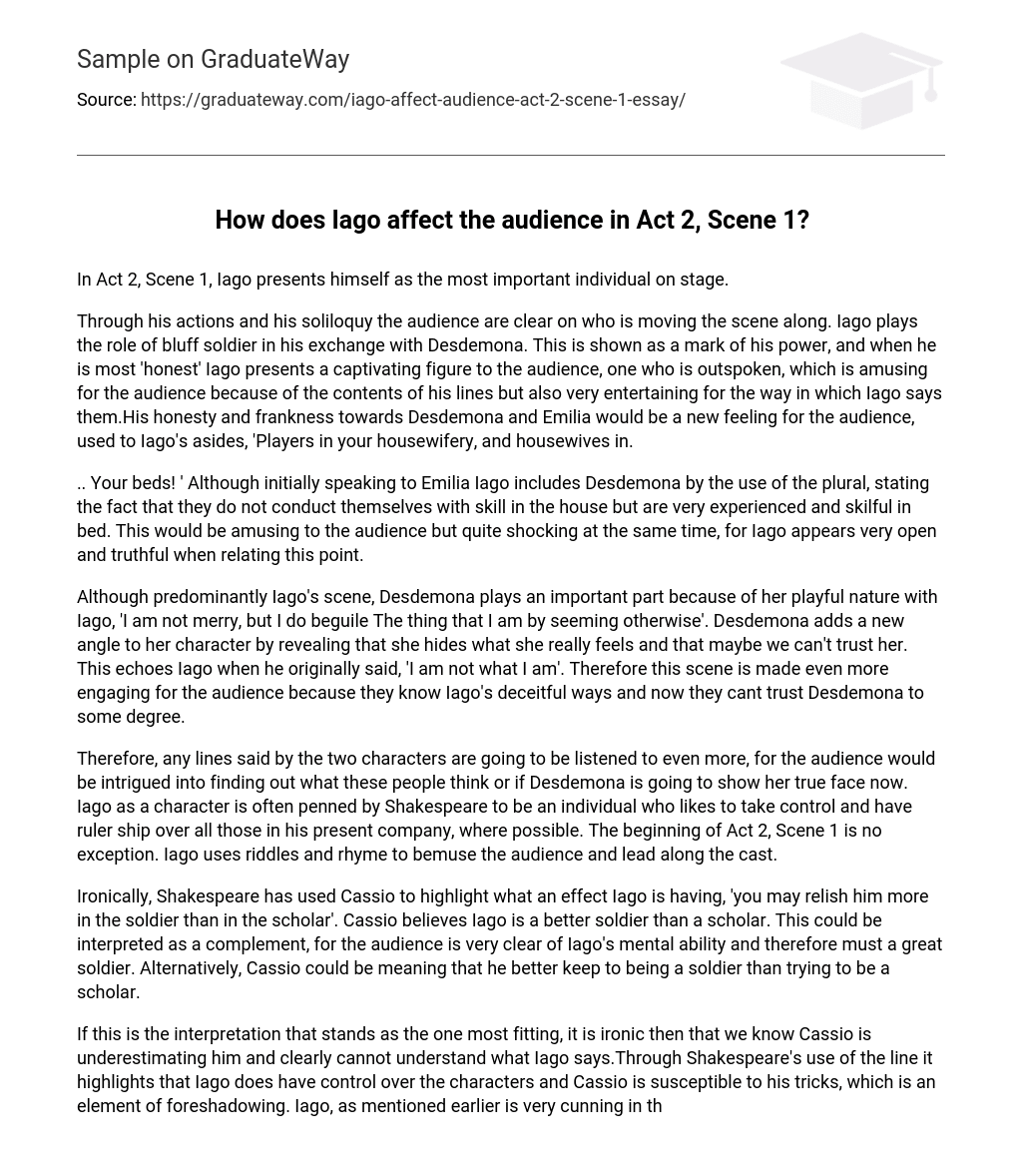In Act 2, Scene 1, Iago presents himself as the most important individual on stage.
Through his actions and his soliloquy the audience are clear on who is moving the scene along. Iago plays the role of bluff soldier in his exchange with Desdemona. This is shown as a mark of his power, and when he is most ‘honest’ Iago presents a captivating figure to the audience, one who is outspoken, which is amusing for the audience because of the contents of his lines but also very entertaining for the way in which Iago says them.His honesty and frankness towards Desdemona and Emilia would be a new feeling for the audience, used to Iago’s asides, ‘Players in your housewifery, and housewives in.
.. Your beds! ‘ Although initially speaking to Emilia Iago includes Desdemona by the use of the plural, stating the fact that they do not conduct themselves with skill in the house but are very experienced and skilful in bed. This would be amusing to the audience but quite shocking at the same time, for Iago appears very open and truthful when relating this point.
Although predominantly Iago’s scene, Desdemona plays an important part because of her playful nature with Iago, ‘I am not merry, but I do beguile The thing that I am by seeming otherwise’. Desdemona adds a new angle to her character by revealing that she hides what she really feels and that maybe we can’t trust her. This echoes Iago when he originally said, ‘I am not what I am’. Therefore this scene is made even more engaging for the audience because they know Iago’s deceitful ways and now they cant trust Desdemona to some degree.
Therefore, any lines said by the two characters are going to be listened to even more, for the audience would be intrigued into finding out what these people think or if Desdemona is going to show her true face now. Iago as a character is often penned by Shakespeare to be an individual who likes to take control and have ruler ship over all those in his present company, where possible. The beginning of Act 2, Scene 1 is no exception. Iago uses riddles and rhyme to bemuse the audience and lead along the cast.
Ironically, Shakespeare has used Cassio to highlight what an effect Iago is having, ‘you may relish him more in the soldier than in the scholar’. Cassio believes Iago is a better soldier than a scholar. This could be interpreted as a complement, for the audience is very clear of Iago’s mental ability and therefore must a great soldier. Alternatively, Cassio could be meaning that he better keep to being a soldier than trying to be a scholar.
If this is the interpretation that stands as the one most fitting, it is ironic then that we know Cassio is underestimating him and clearly cannot understand what Iago says.Through Shakespeare’s use of the line it highlights that Iago does have control over the characters and Cassio is susceptible to his tricks, which is an element of foreshadowing. Iago, as mentioned earlier is very cunning in this scene, and extremely playful with Desdemona, considering his wife, Emilia is in their presence, ‘ If she be fair and wise, fairness and wit, The one’s for use, the other useth it’. Iago is very ambiguous in his use of the word fair.
Depending on the interpretation by the audience, the whole sentence meaning is changed.Iago could be using fair in relation to skin colour or something that is fair and right. Iago carries this though process on, ‘If she be black, and thereto have a wit, She’ll find a white that shall her blackness fit’. Here Iago could be meaning two things.
One could assume his reference to ‘white’ and ‘black’ could be someone’s mood, highlighting that opposites attract. On the other hand it could demonstrate the unusual marriage, in terms of Elizabethan England, of Othello and Desdemona, especially since the use of ‘black’ and ‘white’.On further study one could assume that Shakespeare does intend for it to mean mood and be in reference to Desdemona and Othello. Shakespeare has shown us in this scene that Desdemona cannot be as trusted as was one thought by the audience and therefore she would appear ‘black’, for she is deceptive, compared to that of the ‘valiant moor’, where white would be fitting.
This in itself demonstrates the power and effect Iago has on the audience, through his use of riddle. Iago plays another important role in this scene to show the audience what the other characters are like.Iago’s domination of the scene gives arise for a new light to be shed on Emilia, ‘How if fair and foolish’. Emilia shows to the audience that she is quite perceptive, for she has to parry off of her husband who is grabbing the most attention on stage.
Roderigo is demonstrated in this scene to be nothing more than a plot device due to Iago’s central role. In Iago’s speeches to Roderigo we are let in on the plan to disgrace Cassio. Roderigo’s presence is to avoid Iago continuously making speeches to himself, which may make the structure of the plot seem tired and repetitive.This is coupled with the fact that Roderigo is not a rounded character and his exchanges are always with Iago or another member and as such never leads a scene and is only present to advance the plot and allow Iago to think aloud.
It is clear then that Iago has a far-reaching effect on the audience. One moment he is being humorous and the next he is using riddles that may confuse the audience. This in turn makes Iago a much more interesting character and as such makes Act 2, Scene 1 a central point for the development of Iago’s character and the appreciation of this by the audience.





